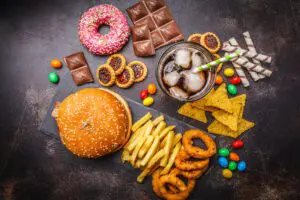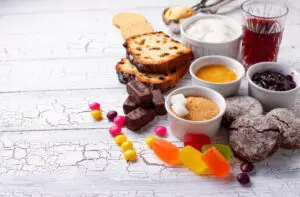Posted on July 4, 2023

Orthodontic treatment, like braces or Invisalign, can be a life-changing experience. However, did you know that the foods you eat during treatment can also have an impact on your progress? While some snacks may seem harmless, they can actually cause damage to your orthodontic appliances.
Orthodontic treatment not only requires a significant investment of time and money but also a willingness to make some lifestyle adjustments. One of the biggest challenges for orthodontic patients is navigating the world of food and drink.
Certain foods can cause damage to braces or lead to an increase in tooth decay, which can ultimately result in longer treatment times and more visits to the orthodontist.
To ensure you are getting the most out of your orthodontic treatment, it is important to avoid certain foods. While it may be difficult to resist your favorite snacks, keep in mind that your orthodontist has recommended these restrictions for a reason.
With that in mind, let’s take a closer look at the foods you should avoid while undergoing orthodontic treatment.
Orthodontic treatment is a significant investment of time and money. When undergoing orthodontic treatment, it’s important to be mindful of the foods you consume. Certain foods can damage braces or other orthodontic appliances, leading to longer treatment times and higher costs.
Here are some reasons why certain foods should be avoided during orthodontic treatment:
 Hard and crunchy foods are one of the biggest culprits that can damage braces or other orthodontic appliances. Hard foods such as nuts, popcorn, and hard candies can break brackets or wires or cause them to come loose.
Hard and crunchy foods are one of the biggest culprits that can damage braces or other orthodontic appliances. Hard foods such as nuts, popcorn, and hard candies can break brackets or wires or cause them to come loose.
Crunchy foods such as apples or carrots can cause brackets or wires to bend or damage orthodontic appliances. As a result, these types of foods should be avoided while undergoing orthodontic treatment.
Examples of hard foods to avoid:
Sticky foods, like caramel or chewing gum, are problematic for those with braces. They can easily get stuck to braces or wires, pulling them off or damaging them when trying to remove them.
To avoid any unwanted damage to their orthodontic appliances, patients should avoid sticky foods until their treatment is completed.
Chewy foods like bagels, licorice, or steak can cause damage to braces or orthodontic appliances.
Similar to sticky foods, chewy foods can pull brackets or wires off their desired placement. During treatment, orthodontic patients should avoid chewy foods that can lead to prolonged and costly treatment.
Sticky foods can get stuck in braces and cause damage because they are difficult to remove from the teeth and brackets.
When we eat sticky foods, they tend to cling to our teeth and braces, making it hard to remove them even with rigorous brushing.
As a result, the sticky food particles can remain on the teeth for an extended period and eventually lead to dental decay or cavities over time. Moreover, some sticky foods can bend or damage the braces, causing them to malfunction or become loose, which can further harm the teeth and gums.
Therefore, it is essential to avoid sticky foods while wearing braces and maintain proper oral hygiene to prevent any damage or decay to the teeth.
 Although sugary foods may not directly damage braces or wires, they can promote tooth decay. During orthodontic treatment, it’s crucial to maintain good oral hygiene.
Although sugary foods may not directly damage braces or wires, they can promote tooth decay. During orthodontic treatment, it’s crucial to maintain good oral hygiene.
This includes limiting sugary foods and drinks, which can lead to dental cavities. It’s important to brush and floss regularly and to schedule regular dental cleanings to prevent dental decay.
Sugary foods and beverages are known to cause tooth decay as they provide bacteria in the mouth with the energy they need to produce acids that attack tooth enamel.
Consuming too much sugar can also lead to the growth of plaque, a sticky film of bacteria that can accumulate on teeth and lead to gum disease.
Limiting your intake of sugary foods and drinks, and maintaining good oral hygiene by brushing and flossing regularly, can help reduce your risk of tooth decay.
It’s important to note that even foods that don’t taste sweet, like crackers and bread, can contain sugars that feed the bacteria in your mouth, so it’s important to pay attention to all sources of sugar in your diet.
If you are undergoing orthodontic treatment, it is important to take extra care of your teeth and avoid certain foods that can harm your braces. One type of food that you should avoid is acidic food. These include citrus fruits, tomatoes, pickles, and vinegar.
Acidic foods can erode the enamel on your teeth and lead to cavities or tooth decay. They can also cause your braces to weaken or break. To protect your teeth and braces, it is best to stay away from acidic foods and choose non-acidic alternatives instead.
For those undergoing orthodontic treatment, certain foods, and drinks are off-limits due to the risk of damaging or dislodging brackets and wires. However, it’s not just sticky and hard foods that should be avoided – there are several other types of foods that can cause issues during orthodontic treatment.
Here’s a list of other types of other foods to avoid during orthodontic treatment:
Meats that are tough to chew, such as steak, can be a challenge for those undergoing orthodontic treatment. These meats can easily get stuck in braces and be difficult to remove, leading to discomfort and potential damage to wires and brackets.
Popcorn is a popular snack food, but it should be avoided during orthodontic treatment. The small kernels can get lodged between teeth and braces, leading to discomfort and the potential for broken wires and brackets.
Bagels and hard rolls are a staple for many, but they can be problematic for those with braces. These foods are hard and chewy, making them difficult to bite and potentially causing damage to wires and brackets.
Carbonated beverages, such as soda and carbonated water, should be avoided during orthodontic treatment. These drinks can erode tooth enamel and lead to tooth decay, and their carbonation can also cause discomfort and potential damage to braces.
During orthodontic treatment, patients need to be mindful of the foods they consume. Hard or crunchy foods, sticky foods, sugary foods, and chewy foods should be avoided until treatment is finished.
By paying attention to the types of foods consumed and maintaining good oral hygiene, patients can help avoid any unexpected damage to their orthodontic appliances.
At Smilebliss, we understand the importance of maintaining good oral health during orthodontic treatment. Our team of experienced orthodontists not only provides exceptional care but also offers guidance on dietary choices that can help you protect your braces and teeth.
Remember, taking good care of your braces and teeth throughout treatment will ensure optimal results and a beautiful, healthy smile. Visit our website or contact us today to schedule a consultation with one of our orthodontic experts.